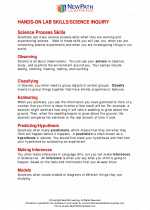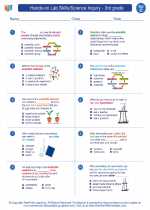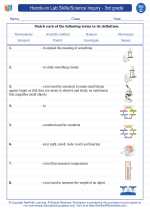Immune System
The immune system is a complex network of cells, tissues, and organs that work together to defend the body against harmful invaders, such as viruses, bacteria, and other pathogens. It is a crucial part of the body's defense system and plays a vital role in maintaining overall health and well-being.
Key Components of the Immune System
- White Blood Cells: These cells are the primary defenders of the immune system and include various types such as T cells, B cells, and macrophages.
- Lymphatic System: This network of vessels and organs, including the spleen and thymus, helps to produce and transport white blood cells throughout the body.
- Antibodies: These proteins are produced by the immune system to identify and neutralize harmful substances.
- Complement System: A group of proteins that work together to destroy and clear pathogens from the body.
Functions of the Immune System
The immune system performs several essential functions, including:
- Identifying and Neutralizing Pathogens: The immune system can recognize and eliminate harmful microorganisms and foreign substances.
- Memory and Recognition: After encountering a specific pathogen, the immune system can develop a memory of it, allowing for a faster and more effective response upon subsequent exposure.
- Regulating Inflammation: The immune system helps to control and resolve inflammation, which is a critical part of the body's response to infection and injury.
Study Guide
To understand the immune system, it's important to study the following key concepts:
- Types of White Blood Cells: Learn about the different types of white blood cells and their specific roles in the immune response.
- Immune Response: Understand the sequence of events that occur when the body encounters a pathogen, including the roles of antibodies, T cells, and B cells.
- Immune Disorders: Explore common immune system disorders such as autoimmune diseases, allergies, and immunodeficiency conditions.
- Immune System Support: Investigate ways to maintain a healthy immune system through proper nutrition, exercise, and stress management.
By mastering these concepts, you'll gain a deeper understanding of the immune system and its crucial role in protecting the body from illness and disease.
[Immune] Related Worksheets and Study Guides:
.◂Science Worksheets and Study Guides Third Grade. Hands-on Lab Skills/Science Inquiry - 3rd grade
Study Guide Hands-on Lab Skills/Science Inquiry - 3rd grade
Hands-on Lab Skills/Science Inquiry - 3rd grade  Worksheet/Answer key
Worksheet/Answer key Hands-on Lab Skills/Science Inquiry - 3rd grade
Hands-on Lab Skills/Science Inquiry - 3rd grade  Worksheet/Answer key
Worksheet/Answer key Hands-on Lab Skills/Science Inquiry - 3rd grade
Hands-on Lab Skills/Science Inquiry - 3rd grade  Worksheet/Answer key
Worksheet/Answer key Hands-on Lab Skills/Science Inquiry - 3rd grade
Hands-on Lab Skills/Science Inquiry - 3rd grade  Worksheet/Answer key
Worksheet/Answer key O-W-L
O-W-L  Vocabulary/Answer key
Vocabulary/Answer key Hands-on Lab Skills/Science Inquiry - 3rd grade
Hands-on Lab Skills/Science Inquiry - 3rd grade  Vocabulary/Answer key
Vocabulary/Answer key Hands-on Lab Skills/Science Inquiry - 3rd grade
Hands-on Lab Skills/Science Inquiry - 3rd grade 

 Worksheet/Answer key
Worksheet/Answer key
 Worksheet/Answer key
Worksheet/Answer key
 Worksheet/Answer key
Worksheet/Answer key
 Worksheet/Answer key
Worksheet/Answer key
 Vocabulary/Answer key
Vocabulary/Answer key
 Vocabulary/Answer key
Vocabulary/Answer key

The resources above cover the following skills:
Science as Inquiry and Process: A student should understand and be able to apply the processes and applications of scientific inquiry. A student who meets the content standard should:
Develop an understanding of the processes of science used to investigate problems, design and conduct repeatable scientific investigations, and defend scientific arguments.